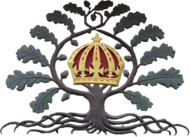
Back توري (محافظ) Arabic Torizm Azerbaijani Τορυισμός Greek Tory French Tóraí Irish Torijevci Croatian Tory ID トーリー党 Japanese 토리 (용어) Korean Tory (Conservadores) Portuguese
| Part of the Politics series on |
| Toryism |
|---|
 |
A Tory (/ˈtɔːri/) is an individual who supports a political philosophy known as Toryism, based on a British version of traditionalist conservatism which upholds the established social order as it has evolved through the history of Great Britain. The Tory ethos has been summed up with the phrase "God, King (or Queen), and Country".[1] Tories are monarchists, were historically of a high church Anglican religious heritage, and were opposed to the liberalism of the Whig party.[2][3]
The philosophy originates from the Cavaliers, a royalist faction which supported the House of Stuart during the Wars of the Three Kingdoms. The Tories, a British political party which emerged during the late 17th century, was a reaction to the Whig-controlled Parliaments that succeeded the Cavalier Parliament.[4] As a political term, Tory was a term derived from the Irish language, that was first used in English politics during the Exclusion Crisis of 1678–1681.
It also has exponents in other parts of the former British Empire, such as the Loyalists of British America, who opposed secession during the American War of Independence. Loyalists who fled to the Canadas at the end of the conflict, known as the United Empire Loyalists, formed the support base for political cliques in Upper and Lower Canada. Toryism remains prominent in the politics of Canada and the United Kingdom. The British Conservative Party and Conservative Party of Canada, and their supporters, continue to be referred to as Tories. Adherents to traditional Toryism in contemporary times are referred to as High Tories, who typically defend the ideas of hierarchy, natural order, and aristocracy.
- ^ Ball, Stuart (2013). Portrait of a Party: The Conservative Party in Britain 1918–1945. Oxford: Oxford University Press. p. 74.
- ^ Sachs, William L. (2002). The Transformation of Anglicanism: From State Church to Global Communion. Cambridge: Cambridge University Press. p. 18. ISBN 9780521526616.
- ^ Charmley, John (2008). A History of Conservative Politics Since 1830. Palgrave Macmillan. p. 103. ISBN 9780333929742.
- ^ "Whigs and Tories". Parliament of the United Kingdom. Retrieved 4 October 2018.